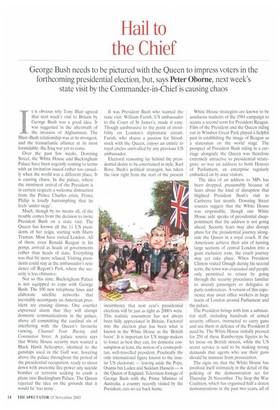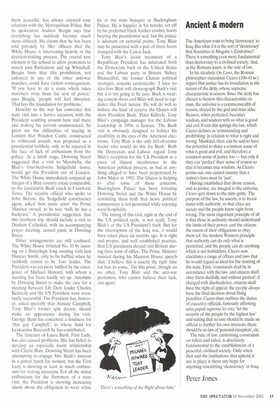Hail to
the Chief
George Bush needs to be pictured with the Queen to impress voters in the forthcoming presidential election, but, says Peter °borne, next week's state visit by the Commander-in-Chief is causing chaos 1 t is obvious why Tony Blair agreed that next week's visit to Britain by George Bush was a good idea. It was suggested in the aftermath of the invasion of Afghanistan. The Blair–Bush relationship was at its strongest, and the transatlantic alliance at its most formidable: the Iraq war yet to come.
Over the past few weeks, Downing Street, the White House and Buckingham Palace have been urgently coming to terms with an invitation issued rather too casually when the world was a different place. It is causing chaos. In the palace, where the imminent arrival of the President is in certain respects a welcome distraction from the Prince Charles crisis, Prince Philip is loudly harrumphing that he feels 'under siege'.
Much, though by no means all, of the trouble comes from the decision to invite President Bush on a state visit. The Queen has known all the 11 US presidents of her reign, starting with Harry Truman. Most have visited London. All of them, even Ronald Reagan in his pomp, arrived as heads of governments rather than heads of state. Everything was that bit more relaxed. Visiting presidents could stay at the ambassador's residence off Regent's Park, where the security is less obtrusive.
Not so this time. Buckingham Palace is not equipped to cope with George
Bush. The 100 new telephone lines and elaborate satellite networks that inevitably accompany an American president are causing dismay. One courtier expressed alarm that they will disrupt domestic communications in the palace, above all committing the cardinal sin of interfering with the Queen's favourite viewing, channel Four Racing and Coronation Street. A palace source says that White House security men wanted a Black Hawk helicopter, identical to the gunships used in the Gulf war, hovering above the palace throughout the period of the presidential occupation, ready to shoot down with awesome fire-power any suicide bomber or terrorist seeking to crash a plane into Buckingham Palace. The Queen rejected the idea on the grounds that it would be 'too noisy'.
It was President Bush who wanted the state visit. William Farish, US ambassador to the Court of St James's, made it easy. Though unobtrusive to the point of invisibility on London's diplomatic circuit, Farish, who shares a passion for bloodstock with the Queen, enjoys an entrée to royal circles unrivalled by any previous US ambassador.
Electoral reasoning lay behind the presidential desire to be entertained in style. Karl Rove, Bush's political strategist, has taken the view right from the start of the present incumbency that next year's presidential elections will be just as tight as 2000's were. This realistic assessment has not always been fully appreciated in Britain. Factored into the election plan has been what is known in the White House as the 'British boost'. It is important for US image-makers to foster as best they can, for domestic consumption at least, the notion of a cosmopolitan, well-travelled president. Practically the only international figure known to the insular US electorate — leaving aside the Pope, Osama bin Laden and Saddam Hussein — is the Queen of England. Television footage of George Bush with the Prime Minister of Australia, a country recently visited by the President, cuts no ice back home. White House strategists are known to be assiduous students of the 1984 campaign to secure a second term for President Reagan. Film of the President and the Queen riding out in Windsor Great Park played a helpful part in establishing the image of Reagan as a statesman on the world stage. The prospect of President Bush riding in a carriage alongside the Queen was therefore extremely attractive to presidential strategists; so was an address to both Houses of Parliament, an enterprise regularly embarked on by state visitors.
The idea of an address to MPs has been dropped, presumably because of fears about the kind of disruption that blighted President Bush's visit to Canberra last month. Downing Street sources suggest that the White House was responsible, though one White House aide speaks of presidential disappointment that the address is not going ahead. Security fears may also disrupt plans for the presidential journey alongside the Queen in a royal coach. If the Americans achieve their aim of turning large sections of central London into a giant exclusion zone, the coach journey may yet take place. When President Clinton visited Omagh during his second term, the town was evacuated and people only permitted to return by going through the security procedures familiar to aircraft passengers or delegates at party conferences. A version of this experience may await office workers in large tracts of London around Parliament and the palace.
The President brings with him a substantial staff, including hundreds of armed security officers, instructed to carry guns and use them in defence of the President if need be. The White House initially pressed for 250 of these Rambo-type figures to be let loose on British streets, while the US secret service is said to be making strong demands that agents who use their guns should be immune from prosecution.
The signs are that the White House has involved itself intimately in the detail of the policing of the demonstration set for Thursday 20 November. The Stop the War Coalition, which has organised half a dozen demonstrations in the past two years, all of them peaceful, has always enjoyed easy relations with the Metropolitan Police. But its spokesman Andrew Burgin says that everything has suddenly become much more difficult. He claims that he has been told privately by Met officers that the White House is intervening heavily in the decision-making process. The crucial new element is the refusal to allow protesters to march past Parliament and up Whitehall. Burgin hints that this prohibition, not enforced in any of the other anti-war marches. could have violent consequences. 'If you have to do a route which takes marchers away from the seat of power,' says Burgin, 'people will feel thwarted. That lays the foundation for problems.'
Hostility to the war has converted this state visit into a furtive occasion, with the President scuttling around here and there and making his arrivals unannounced. So great are the difficulties of staying in London that Windsor Castle, constructed to withstand assault, was proposed as a presidential bolthole, only to be rejected in the face of lack of enthusiasm from the palace. At a latish stage, Downing Street suggested that a visit to Myrobella, the Blair's four-bedroom Sedgefield home, would get the President out of London. The White House immediately conjured up images of a Blair country estate comparable to the formidable Bush ranch in Crawford, Texas. The security official who spoke to John Burton, the •Sedgefield constituency agent. asked 'how many acres' the Prime Minister owned, to be told 'well, he has a backyard.' A presidential suggestion that this northern trip should include a visit to Durham Cathedral, with an accompanying prayer meeting, caused panic in Downing Street.
Other arrangements are still confused. The White House irritated No. 10 by insisting on a flatteringly long meeting with fain Duncan Smith, only to be baffled when he suddenly ceased to be Tory leader. The President was yet more baffled by the emergence of Michael Howard, with whom a meeting has been hastily set up. Attempts by Downing Street to make the case for a meeting between Lib Dem leader Charles Kennedy and the US President were eventually successful. The President has, however, asked specially that Alastair Campbell, Tony Blair's former spin doctor, should make an appearance during his visit. George Bush has conceived a fondness for 'that guy Campbell', to whose fund for Leukaemia Research he has contributed.
The itinerary of Laura Bush, First Lady, has also caused problems. She has failed to develop an especially warm relationship with Cherie Blair. Downing Street has been attempting to engage Mrs Bush's interest in a power lunch for women, but the First Lady is showing at least as much enthusiasm for visiting museums. For all the initial enthusiasm for the flummery of a state visit, the President is showing increasing alarm about the obligation to wear white tie at the state banquet at Buckingham Palace. He is happier in his tuxedo, set off by his preferred black leather cowboy boots bearing the presidential seal, but the palace is adamant on sartorial points. Tony Blair may be presented with a pair of these boots stamped with the Union Jack.
Tony Blair's lavish treatment of a Republican President has infuriated both the Democrats back in the United States and the Labour party in Britain. Sidney Blumenthal, the former Clinton political strategist, remarks sardonically: 'I have no idea how Blair will choreograph Bush's visit but it is not going to be easy. Bush is wearing cement shoes and Blair will need to tapdance like Fred Astaire. He will do well to imitate the kind of reserve the Queen will show President Bush.' Peter Kilfoyle, Tony Blair's campaign manager for the Labour leadership in 1994, is furious: 'The Bush visit is obviously designed to bolster his credibility in the eyes of the American electorate. Tony Blair is the only left-of-centre leader who would do this for Bush.' Both the Democrats and Labour regard Tony Blair's reception for the US President as a piece of blatant interference in the American political process, as bad as anything alleged to have been perpetrated by John Major in 1992. The Queen is helping to allay some of these concerns. Buckingham Palace has been irritating Downing Street and the White House by reminding them both that heavy political commentary is not permitted while enjoying royal hospitality.
The timing of this visit, right at the end of the US political cycle, is not really Tony Blair's or the US President's fault. But for the interruption of the Iraq war, it would have taken place six months ago. It is right and proper, and well established practice, that US presidents should visit Britain during their term of office. The Prime Minister insisted during his Mansion House speech that: 'I believe this is exactly the right time for him to come.' On this point, though on no other, Tony Blair and the anti-war protesters, who cannot believe their luck, can agree.



























































































 Previous page
Previous page